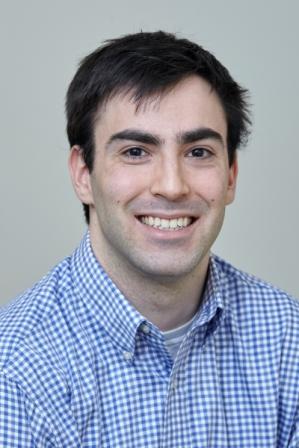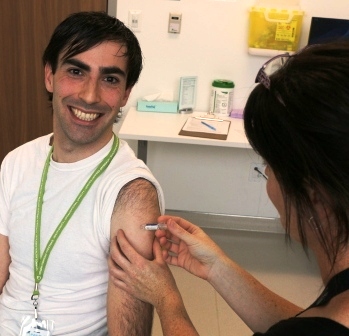Last week we officially welcomed Dr. Matthew Tenenbaum to our WDG Public Health team as Associate Medical Officer of Health (AMOH). Stationed at our Guelph office on Chancellors Way, Dr. Tenenbaum will provide oversight, support and medical expertise to staff and community partners. Having him on board means added support for our growing communities and ensures we will remain responsive to local needs.

Importantly, he will also assume the medical responsibilities of the Medical Officer of Health when Dr. Mercer is not available.
Before joining WDG Public Health, Dr. Tenenbaum worked for several years as a family physician in Hamilton. He completed his residency in Public Health and Preventive Medicine at McMaster University, during which he spent time at several health units in southern Ontario.
We sat down with Dr. Tenenbaum to find out what drives him a physician and as a leader; what enticed him to switch from private practice to Public Health; and why he was the perfect fit to chair a committee on procedures and bylaws (really!)
What makes you passionate about health and medicine?
My passion for medicine is driven by a desire to help people live fuller lives, and also my own curiosity. From a young age I wanted to understand how the human body worked, what makes people ill, and how we can intervene to allow people to become healthier. During medical school, I began to rethink the question of “what makes people ill” to think of causes further upstream, which naturally led me to focus on the social determinants of health and the work of public health.
“My plan was always to work in Public Health, because it allows me to have an impact on the social and environmental conditions that allow people to live and (hopefully) thrive.”
Before coming to WDG Public Health, you were a family physician in Hamilton. What inspired you to make the switch?
While working as a family doctor in Hamilton, I completed my residency training in Public Health at McMaster University. My plan was always to work in Public Health, because it allows me to have an impact on the social and environmental conditions that allow people to live and (hopefully) thrive. It’s incredibly rewarding to work as a family doctor and help individual patients quit smoking, for example – but working to create healthier communities where people aren’t smoking in the first place is satisfying (and challenging) in a different kind of way.
What’s different about working in Public Health versus a private practice?
One of the biggest differences is the pace of the work. As a family doctor, I’d see a different patient every 15-30 minutes – I was always on my feet. In that brief time period, I’d have to understand the patient’s health issue and develop a plan to address it. In public health, we try to focus upstream and tackle different kinds of problems. We may spend weeks or months developing a new program or service, for example, so that we can consult community stakeholders, fully understand the nature of a problem and develop a robust plan to address it effectively.
What are you most excited to work on at WDG Public Health?
I feel very lucky to be working at WDG Public Health, since we will be developing a new strategic plan in 2019. This plan will reflect our vision for what a healthy community looks like and will guide our decisions about programs and services for the coming years. As someone who wants to have a big impact, I’m quite excited to be part of our organization’s strategic planning process.
“I’m quite interested in health equity—this refers to our focus on knocking down barriers that keep some groups in society from achieving the same good health as others.”
What do you see as the biggest, most important public health issue or challenge in 2019?
There are many important things that public health does, and I don’t want to elevate one issue above the others. However, I’m quite interested in health equity—this refers to our focus on knocking down barriers that keep some groups in society from achieving the same good health as others. We have a lot of great data that helps us understand important differences in health status throughout Wellington, Dufferin and Guelph, and which can enable us to be more deliberate in our programming so that everyone enjoys good health.
What are the values that drive you as a public health physician?

If I had to name three, I’d list Integrity, Curiosity, and Optimism.
First, I think it’s incredibly important that public health is seen as honest and credible, and I feel a strong obligation to maintain the trust that community members place in us.
Second, I always try to keep an open mind, listen to stakeholders and ask how we can be more effective at what we do.
Third, I believe that our community has a bright future and that we can have a meaningful impact on people’s health and happiness.
Who inspires you?
I’m a big fan of André Picard, the health columnist for The Globe and Mail. I think he does an excellent job of explaining important health issues in a way that anyone can relate to, and calling attention to parts of our health system that need to be improved.
What would people be surprised to know about you?
I have a bizarre affection for reading policies, statutes, regulations and other documents that most people find exceedingly dull. Back when I studied at McMaster University, I chaired the Bylaws & Procedures committee for the student union and became the resident expert on Roberts Rules of Order.
And finally (importantly!), what are you currently watching on Netflix?
Right now, I’m watching the third season of A Series of Unfortunate Events. I was a huge fan of the book series as a kid, and I think the Netflix adaptation is very well done.
